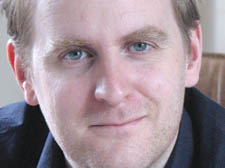|
|
 |
| |

Nick Cornwell, aka celebrated new author Nick Harkaway |
Camden Features | Nick Cornwell | The Gone Away World | Nick Harkaway
Nick Cornwell has chosen
to publish his first novel under a pseudonym. But this dazzling new talent need not fear comparisons with his father, writes Gerald Isaaman
HE is clever, upbeat, confident and has a touch of his handsome father’s good looks – plus his own distinctive voice that shouts at the TV at moments of hiatus that frustrate him.
He employs the same creative imagination and inquisitiveness that bombards all barriers with delicious wit and wisdom, though not with quite the same precision and discipline.
And he feeds off the same worrying passion for politics and its pointlessness while displaying the warmth, charm and grace of his mother and her fair smile.
Being the son of John le Carré, master storyteller in the corrosive world of spies and espionage, is a danger in itself. Nick Cornwell, now 35 and making his literary debut as an author with a huge, tumbling, humbling novel of expectation, recognised that long ago.
At University College School in Hampstead he was sometimes tormented for having a famous father, so much so that when he went back for a nerve-wracking event last month and walked along the corridors of his youth he half expected someone to sneak up and bat him round the head.
Now he is unfazed by journalists queuing to interview him at his 17th century cottage, tucked away behind Hampstead High Street, because he has seen it all before – TV cameras and interviewers pouring into the nearby family home in Gainsborough Garden for a trip through Smiley’s circus of intrigue and brutal assassination.
“I have obviously lived with the issue of being my father’s son,” he says grimly. “It isn’t always simple and you cannot escape it. It does not go away and you can’t conceal it. If you look at my reviews on Amazon some are glowing and wonderful and some are vituperative, saying the only reason my book was published is because the author is the son of John le Carré.”
But he need not concern himself. The real reviews have applauded him as a dazzling new talent whose exhausting book is an extraordinary success.
Yet, naively and almost sentimentally, Nick insists he never expected such a fuss, despite the £300,000 he has been paid by Heinemann, for The Gone-Away World – a tome that stretches round the globe and engulfs 532 pages even after he slashed some 25,000 words.
He took the precaution of submitting it through an agent under the pseudonym Nick Harkaway, chosen not to shrug off his father’s fame but for the prosaic reason that in any Waterstone bookshop you will find novelists Patricia and Bernard Cornwell dominating all the C-shelf space. And he feared being lost in the mire.
The birth of the book was, in le Carré fashion, somewhat secretive, something he began writing two years ago after deciding his nine years in the film industry had been a wasted adventure in his desire to script a monumental movie with the environment as its subject was doomed by lack of funding, as well as opportunity.
He had just married his lawyer wife Clare, and told only her about his account of a faithful friendship, of lovelorn dilemmas in strange and dangerous places in the aftermath of nuclear war that goes wrong. It’s about the fate of a world reduced to a 40-mile band inside which everyone lives.
It sounds cosmic and futuristic but it isn’t. “It is fantasy land but it is immediately recognisable as our world, where the majority of us live in a sanitised and vaccinated stretch of land, too frightened to see what’s outside it,” explains Nick.
There is a real zest, a freshness and sharpness in the writing that has been born out of his frustrations at school.
At Cambridge, where he studied philosophy and politics, he decided that, though he may well want to save the world with Superman skills, politics was neither the route nor the solution. “The business of getting elected and the business of doing government are two different things,” he points out.
“And almost irrevocably they compomise each other because you have to pledge yourself to a party. The Russian revolution compromised itself, not deliberately, but in order to gain sufficient force to do what it wanted to do. There’s always a kind of internal corruption involved that destroys ambitions.”
He believes he has found his metier and a second novel is already taking over his laptop, which he uses to input esoteric information from the internet and output his own fiction, sometimes from a seat in a local café, where he enjoys observing life.
And he is at ease with himself – and with his parents, who brought him to live initially in Gayton Crescent when he was six. “They are pleased with me,” he says with a sigh. “There have been times when they have worried, as parents do. There have been times when I have worried about me too. And it could all go pear-shaped again tomorrow if nobody buys my book.”
But Nick Harkaway stands tall and proudly in his own right and looks to me more like a runaway success due to rule the bestseller charts – and many hearts and minds en route round the gone-away world.
|

|
 |
|
 |
|

